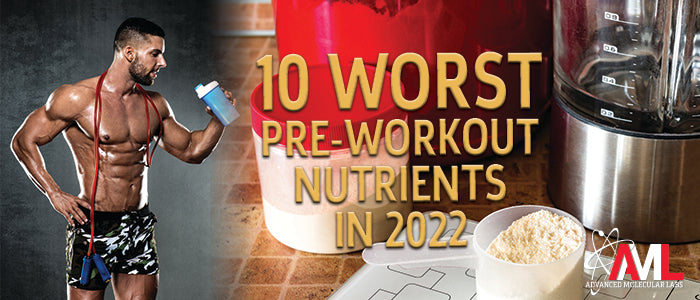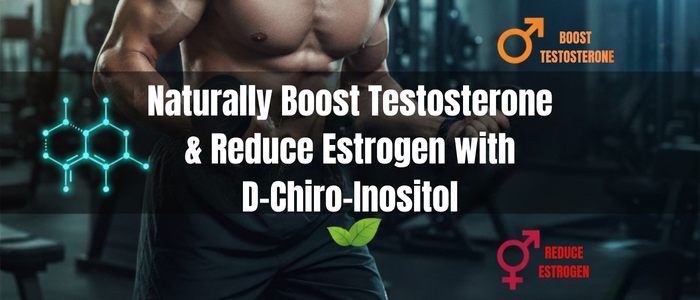


Discover the Worst Pre Workout Supplements: Top 10 List
By Robert Schinetsky
When it comes to choosing the right pre-workout supplements, it's crucial to be informed about the worst pre workout ingredients that could hinder your performance or even pose health risks. Understanding which nutrients to avoid can help you make better choices and optimize your workout results. This guide will delve into the most problematic ingredients found in the worst pre workout supplements, ensuring you stay informed and make safe choices.
L-Arginine
Before L-Citrulline rose to fame, nitric oxide boosters and pump pre workouts were fueled by L-arginine. In theory, this made sense -- Arginine is the amino acid that serves as the fuel for nitric oxide production. Therefore, supplementing with free form L-arginine should increase blood levels of arginine, leading to greater NO production, vasodilation, blood flow, and muscle pumps. Unfortunately, the theory doesn't really hold up.
Numerous studies have shown that orally supplemented L-arginine (the same form used in many pre workouts), even when dosed as high as 6g/day, has no benefit on nitric oxide production or athletic performance.
This begs the question -- why is L-arginine still used extensively in pre workouts claiming to enhance the pump?
Well, preliminary research L-arginine (at a massive 30g dose!) elevated nitric oxide levels in sick and healthy humans. The issue is that virtually every single person taking supplements to boost nitric oxide consumes them orally.
When L-arginine is supplemented orally, it's been shown to have no effect compared to an infusion of L-arginine. This is due to arginine's poor bioavailability, which is around 20%. When ingested, arginine is rapidly broken down by intestinal arginase and converted to ornithine and urea, which means that if you were to ingest 10g of arginine, you'd only absorb about 2g worth.
To circumvent this issue, you could consume upwards of 20-30g arginine, but that is known to come with a great deal of GI distress and stomach upset, which isn't exactly ideal pre workout. L-citrulline on the other hand is highly bioavailable, avoids metabolization by arginase, and has been shown to improve blood flow, energy production, and exercise performance.
BCAAs
Much like L-arginine, BCAA supplements have been (and continue to be) one of the most popular and overhyped pre workout (or intra workout) supplements on the market. BCAA supplements gained notoriety when it was discovered that the trio of amino acids (primarily leucine) activated mTOR -- the biological pathway that triggers muscle protein synthesis.
Additionally, the BCAAs can serve as an energy substrate in skeletal muscle, which may help to limit muscle protein breakdown as well as glycogen depletion during prolonged exercise. Adding further fuel to the fire were a few early studies indicating that BCAA supplements may help preserve lean mass and even enhance fat loss.
However, these studies had a few glaring errors. Namely, the protein intake of the test group was severely deficient. Furthermore, individuals in the test group consumed an amount of BCAA that's over 10 times higher (52 grams per day!) than what you get in a conventional BCAA supplement!
On top of that, other BCAA research presented results that seem just a bit too good to be true, as it showed consuming 14g of BCAA was superior to consuming 28 grams of whey protein. Here again, neither overall diet nor protein intake was controlled or accounted for by the researchers, which is a pretty substantial oversight considering you're trying to track increases in performance, size, and strength.
A recent narrative review published in the Journal of Nutritional Health & Food Engineering noted that despite enough evidence showing the ability of BCAAs, particularly leucine, to up-regulate muscle protein synthesis, there is no provision towards additional benefit to performance or adaptations to resistance and endurance training with supplementation. In conclusion, peri-exercise BCAA supplementation appears to be most effective only in terms of recovery between exercise sessions and the preservation of both muscle mass and muscle performance under states of hypocalorism.
Now, there is research to indicate that BCAA supplementation may help improve recovery following exercise and reduce soreness, but a 2018 study concluded that BCAA supplementation may mitigate muscle soreness following muscle-damaging exercise. However, when consumed with a diet consisting of ~1.2 g/kg/day protein, the attenuation of muscular performance decrements or corresponding plasma CK levels are likely negligible.
Basically, if you're consuming enough protein, the benefits of BCAA supplements are negligible. There's also some evidence indicating that BCAA supplementation may decrease dopamine levels. This is due to the fact that BCAAs (leucine, in particular) competitively inhibit the dopamine precursor, L-Tyrosine. This is concerning since research indicates that fatigue appears to set in when dopamine levels start to drop while serotonin levels remain elevated.
At the end of the day, if you're consuming enough total calories and/or dietary protein, consuming BCAA supplements pre workout is unlikely to yield any substantial improvement in performance or lean mass gains.
L-Glutamine
L-Glutamine is a conditionally essential amino acid that has been touted as a muscle builder and performance booster for well over a decade. Part of the reason that glutamine is considered a muscle building ingredient is that it is the most abundant amino acid in the body, with ~61% of bodily stores located in skeletal muscle tissue.
Glutamine is involved in protein synthesis, and it can even serve as a sort of fuel for various cells in the body, including important immune system components in lymphocytes and macrophages. Additionally, glutamine supplementation could theoretically since, in the body, glutamine can:
- Stimulate glycogen synthesis
- Limit accumulation of ammonia
- Reduce muscle damage
- Supporting Krebs (TCA) cycle function
However, a 2019 review titled Glutamine as an Anti-Fatigue Amino Acid in Sports Nutrition concluded that most of the studies evaluated observed that glutamine supplementation improved some fatigue markers, such as increased glycogen synthesis and reduced ammonia accumulation, but this intervention did not increase physical performance. Thus, despite improving some fatigue parameters, glutamine supplementation seems to have limited effects on performance.
Other previous research has shown that glutamine supplementation has absolutely no benefit on athletic performance, strength, muscle growth, or recovery. L-Glutamine also has low bioavailability and is primarily utilized by the cells lining the GI tract, which means very little of it (if any) reaches the small intestine and can subsequently be transported to the bloodstream.
L-Carnitine
Carnitine is an amino acid derivative that supports energy production and fat burning by way of acting as the biological taxi for fatty acids. In case you didn't know, long-chain fatty acids cannot enter the mitochondria on their own. They require the services of carnitine to transfer them into mitochondria for subsequent β-oxidation (the burning of fatty acids for energy).
Based on the roles of carnitine in the body, it's thought that supplementing with additional carnitine can improve exercise performance, fat burning, and weight loss. However, the research doesn't really pan out as the results are mixed. Some studies find benefit, while others find no performance or lean mass improvements at all.
A recent 2020 review on Carnitine supplementation also concluded that theoretically, carnitine supplementation should increase carnitine muscle content thus improving fatty acid oxidation and exercise function in healthy humans. However, so far, no scientific basis supports improvement in exercise performance for healthy individuals or athletes after carnitine supplementation.
Another 2020 systematic review, including 11 studies, noted that twenty-four-weeks of LC supplementation did not affect muscle strength in healthy aged women, but significantly increased muscle mass, improved physical effort tolerance and cognitive function in centenarians.
Furthermore, research indicates that healthy individuals do not need to consume supplemental L-carnitine as the liver and kidneys are capable of generating sufficient amounts from the essential amino acids lysine and methionine to meet daily needs. It's also worth noting, like several of the other ingredients on this list, L-Carnitine suffers from poor bioavailability (between 5-15%).
Basically, carnitine may be helpful to those individuals who do not consume enough protein and/or animal products (vegans, vegetarians, elderly), but healthy individuals do not appear to need and/or benefit from L-carnitine supplementation. There's also the carnitine-TMAO link to consider as well.
TMAO (trimethylamine-N-oxide) is considered to be an independent and dose-dependent risk factor for cardiovascular disease (CVD). Long-term supplementation of L-carnitine has been noted to induce an increase of fasting plasma trimethylamine-N-oxide (TMAO) levels.
However, other studies in humans have noted that while L-Carnitine does increase TMAO levels, it doesn't increase markers of atherosclerosis, inflammation, or oxidative stress. Still, researchers make it clear that additional studies focusing on long-term supplementation and its longitudinal effect on the TMAO metabolism and cardiovascular system are needed.
Agmatine Sulfate
Derived from L-arginine, agmatine sulfate is commonly included alongside L-citrulline to prolong and intensify nitric oxide production, blood flow, and muscle pumps. The reason for this is due to some research indicating that agmatine may indirectly support nitric oxide production via inhibition of arginase -- the enzyme that breaks down arginine -- as well as stimulation of endothelial nitric oxide synthase (eNOS) -- the enzyme that catalyzes NO production in the body.
Theoretically, by limiting arginase activity, blood levels of arginine should remain elevated longer promoting stronger, longer-lasting NO production, blood flow, and muscle pumps. However, research demonstrating the NO-boosting effects of agmatine when consumed orally in humans is severely lacking.
There is some research suggesting that agmatine may have some neurological and endocrine benefits, including a reduction in perceived pain, but in terms of boosting blood flow and/or athletic performance the evidence just isn't there yet.
Glycerol
Glycerol combined with water hyperhydration increases total body water when compared with water hyperhydration alone. Research has shown that glycerol ingestion may increase exercise tolerance in terms of time by approximately 24% as well as the length of time that can be spent exercising because of the improvement in physical endurance. Additionally, heart rate during exercise appears to be significantly lower following ingestion of glycerol.
However, other research has found that hyperhydration with glycerol compared with hyperhydration with water alone does not improve performance. Moreover, the doses of glycerol used in these studies (between 1-1.2g/kg of bodyweight) far exceed the paltry 1-3 grams of glycerol (in the form of 65% glycerol-containing supplements) you'll find in current pre workouts supplements.
Another potential concern is the silica content of glycerol supplements. In case you weren't aware, glycerol is extremely hygroscopic, meaning it loves water. To prevent the glycerol in pre workout supplements from clumping, glycerol liquid is dried into a powder and mixed with copious amounts of silicon dioxide. The FDA has set upper limits on the consumption of silicon dioxide not to exceed 2% of food total weight. This is mainly because amounts higher than these limits haven't been sufficiently studied.
It's also worth mentioning that animal studies suggest that consumption of glycerol monostearate (GMS) increases the exposure to phthalate esters, which can reduce testosterone levels.
Taurine
Taurine is a conditionally essential amino acid, and an ingredient commonly found in energy drinks and many pre workout supplements. In the body, taurine is predominantly stored in the heart, brain, and skeletal muscle tissue. It can help cells retain more water due to its osmolytic properties, and it can also act as a fairly potent antioxidant.
Similar to many of the other ingredients on this list, the research surrounding taurine supplementation and exercise performance is mixed. Some studies indicate that taurine may improve exercise performance and support recovery from damaging and stressful exercise, while others find no significant benefit.
Interestingly, a 2017 study found that a dose of 50 mg/kg dose of taurine outperformed caffeine, placebo, and caffeine + taurine on performance changes after repeated Wingate anaerobic capacity tests. This evidence is further bolstered by other research noting that that the combination of taurine + caffeine does not improve performance, energy, or attention.
These aforementioned studies (typically using energy drinks which contain taurine and caffeine) did note that the taurine + caffeine combination did reduce feelings of vigor and the stimulating effects of caffeine, likely due to taurine's effects on GABA -- the body's primary inhibitory (downer) neurotransmitter. Furthermore, research also noted that the combination of caffeine and taurine actually increased feelings of fatigue.
Based on the current body of evidence, taurine supplementation on its own may offer benefit, but outcomes continue to be mixed regarding taurine supplementation, especially when used in combination with caffeine (as it typically is with pre workout supplements and energy drinks).
Unproven Stimulants
The main reason most people take pre workout supplements is for the boost in energy they provide. This energy infusion largely comes from caffeine -- a stimulant that has been extensively studied and shown to not only be effective for improving exercise performance, but safe (when used in reasonable dosages -- 3-9mg/kg).
However, some pre workout supplements include stimulants beyond caffeine. Ones that are woefully under-researched in human beings. Included among those stimulants that are unproven, unsafe, and/or not classified as dietary supplements are:
- Higenamine
- Hordenine
- Phenylethylamine (PEA)
- Isopropylnorsynephrine
- DMAA
- DMHA
- DMBA (AMP Citrate)
- Theophylline
- Dendrobium extract
The stimulants, and the potential issues (side effects) they bring, have been discussed at length in previous articles titled:
- Stim Hype! Show Me the Science
- NEW HARVARD STUDY! HIGENAMINE CONCERNS! Stimulant In Some Pre-Workouts And Fat Burners!
Without rehashing the entirety of those previous articles, these stimulants essentially lack extensive safety/performance research in healthy human subjects. There is also the concern that supplements listing these ingredients on their respective Supplement Facts Panel don't actually label claims, which is backed up by studies showing just that.
Exogenous Ketones
Ketone supplements have steadily risen in popularity in recent years, in large part due to the surge in popularity of ultra-low/no carb diets, including keto and carnivore. We've covered ketone supplements rather in-depth previously, both in regards to exercise and fat loss.
To highlight the points made in those previous articles… Ketone supplements supply the body with exogenous forms of ketone bodies, specifically beta-hydroxybutyrate (BHB). In the absence of glucose (the body's preferred source of energy), BHB serves as the main energy source for cells, in the brain as well as skeletal muscle tissue.
Researchers estimate that a keto-adapted individual can produce 150+ grams of ketones daily after adapting to a complete fast, and between 50-100 grams per day on a properly constructed ketogenic diet. BHB is also known to:
- Combat oxidative stress
- Reduce inflammation
- Support cognition in individuals with neurological disorders
When you also take into consideration that BHB is capable of delivering more energy per unit of oxygen consumed than either glucose or fatty acids (the two fuels typically used by skeletal muscles during exercise), it stands to reason that consuming more of them in the peri-workout window would improve performance via greater energy production.
Unfortunately, when it comes to boosting exercise performance, the data does not really support the use of exogenous ketone supplements (BHB salts and ketone esters). In particular, supplementation with exogenous ketones is noted to:
- Result in decreased average power output
- Inhibit the use of glycogen
- Offer no improvement in cognitive performance following exercise
A 2017 review on Ketone Bodies and Exercise Performance concluded that there is currently no evidence to support the use of ketone bodies as an ergogenic aid under conditions where optimal evidence-based nutritional strategies are applied. Until more research is published noting improvements in performance following ketone supplementation, it simply doesn't make sense to supplement with them...
In conclusion, when selecting pre-workout supplements, it's vital to avoid the worst pre workouts that contain ineffective or potentially harmful ingredients. By understanding which components to steer clear of, you can ensure that you are choosing the safest and most effective supplements to enhance your workout performance and overall health.




